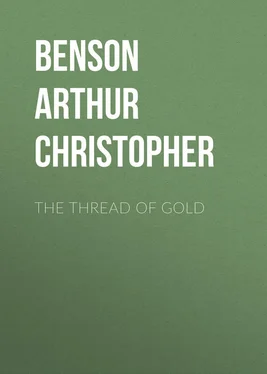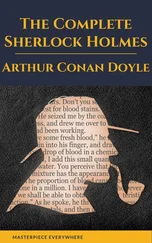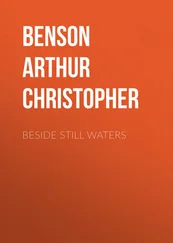Arthur Christopher Benson - The Thread of Gold
Здесь есть возможность читать онлайн «Arthur Christopher Benson - The Thread of Gold» — ознакомительный отрывок электронной книги совершенно бесплатно, а после прочтения отрывка купить полную версию. В некоторых случаях можно слушать аудио, скачать через торрент в формате fb2 и присутствует краткое содержание. ISBN: , Жанр: foreign_antique, foreign_prose, на английском языке. Описание произведения, (предисловие) а так же отзывы посетителей доступны на портале библиотеки ЛибКат.
- Название:The Thread of Gold
- Автор:
- Жанр:
- Год:неизвестен
- ISBN:http://www.gutenberg.org/ebooks/30326
- Рейтинг книги:3 / 5. Голосов: 1
-
Избранное:Добавить в избранное
- Отзывы:
-
Ваша оценка:
- 60
- 1
- 2
- 3
- 4
- 5
The Thread of Gold: краткое содержание, описание и аннотация
Предлагаем к чтению аннотацию, описание, краткое содержание или предисловие (зависит от того, что написал сам автор книги «The Thread of Gold»). Если вы не нашли необходимую информацию о книге — напишите в комментариях, мы постараемся отыскать её.
The Thread of Gold — читать онлайн ознакомительный отрывок
Ниже представлен текст книги, разбитый по страницам. Система сохранения места последней прочитанной страницы, позволяет с удобством читать онлайн бесплатно книгу «The Thread of Gold», без необходимости каждый раз заново искать на чём Вы остановились. Поставьте закладку, и сможете в любой момент перейти на страницу, на которой закончили чтение.
Интервал:
Закладка:
I do not readily submit to this mood, and I would wish it away. I would rather feel joyful and free from blame; but Gray called it a good easy state, and it certainly has its compensations. It does not, like Melancholy, lay a dark hand on duties and pleasures alike; it is possible to work, to read, to talk, to laugh when it is by. But it sends flowing through the mind a gentle current of sad and weary images and thoughts, which still have a beauty of their own; it tinges one's life with a sober greyness of hue; it heightens perception, though it prevents enjoyment. In such a mood one can sit silent a long time, with one's eyes cast upon the grass; one sees the delicate forms of the tender things that spring softly out of the dark ground; one hears with a poignant delight the clear notes of birds; something of the spring languors move within the soul. There is a sense, too, of reaching out to light and joy, a stirring of the vague desires of the heart, a tender hope, an upward-climbing faith; the heart sighs for a peace that it cannot attain.
To-day I walked slowly and pensively by little woods and pastures, taking delight in all the quiet life I saw, the bush pricked with points of green, the boughs thickened with small reddening buds, the slow stream moving through the pasture; all the tints faint, airy, and delicate; the life of the world seemed to hang suspended, waiting for the forward leap. In a little village I stood awhile to watch the gables of an ancient house, the wing of a ruined grange, peer solemnly over the mellow brick wall that guarded a close of orchard trees. A little way behind, the blunt pinnacles of the old church-tower stood up, blue and dim, over the branching elms; beyond all ran the long, pure line of the rising wold. Everything seemed so still, so serene, as a long, pale ray of the falling sun, which laboured among flying clouds, touched the westward gables with gold – and mine the only troubled, unquiet spirit. Hard by there was an old man tottering about in a little garden, fumbling with some plants, like Laertes on the upland farm. His worn face, his ragged beard, his pitifully-patched and creased garments made him a very type of an ineffectual sadness. Perhaps his thoughts ran as sadly as my own, but I do not think it was so, because the minds of many country-people, and of almost all the old, of whatever degree, seem to me free from what is the curse of delicately-trained and highly-strung temperaments – namely, the temptation to be always reverting to the past, or forecasting the future. Simple people and aged people put that aside, and live quite serenely in the moment; and that is what I believe we ought all to attempt, for most moments are bearable, if one only does not import into them the weight of the future and the regret of the past. To seize the moment with all its conditions, to press the quality out of it, that is the best victory. But, alas! we are so made that though we may know that a course is the wise, the happy, the true course, we cannot always pursue it. I remember a story of a public man who bore his responsibilities very hardly, worried and agonised over them, saying to Mr Gladstone, who was at that time in the very thick of a fierce political crisis: "But don't you find you lie awake at night, thinking how you ought to act, and how you ought to have acted?" Mr Gladstone turned his great, flashing eyes upon his interlocutor, and said, with a look of wonder: "No, I don't; where would be the use of that?" And again I remember that old Canon Beadon – who lived, I think, to his 104th year – said to a friend that the secret of long life in his own case was that he had never thought of anything unpleasant after ten o'clock at night. Of course, if you have a series of compartments in your brain, and at ten o'clock can turn the key quietly upon the room that holds the skeletons and nightmares, you are a very fortunate man.
But still, we can all of us do something. If one has the courage and good sense, when in a melancholy mood, to engage in some piece of practical work, it is wonderful how one can distract the great beast that, left to himself, crops and munches the tender herbage of the spirit. For myself I have generally a certain number of dull tasks to perform, not in themselves interesting, and out of which little pleasure can be extracted, except the pleasure which always results from finishing a piece of necessary work. When I am wise, I seize upon a day in which I am overhung with a shadow of sadness to clear off work of this kind. It is in itself a distraction, and then one has the pleasure both of having fought the mood and also of having left the field clear for the mind, when it has recovered its tone, to settle down firmly and joyfully to more congenial labours.
To-day, little by little, the cloudy mood drew off and left me smiling. The love of the peaceful and patient earth came to comfort me. How pure and free were the long lines of ploughland, the broad back of the gently-swelling down! How clear and delicate were the February tints, the aged grass, the leafless trees! What a sense of coolness and repose! I stopped a long time upon a rustic-timbered bridge to look at a little stream that ran beneath the road, winding down through a rough pasture-field, with many thorn-thickets. The water, lapsing slowly through withered flags, had the pure, gem-like quality of the winter stream; in summer it will become dim and turbid with infusorial life, but now it is like a pale jewel. How strange, I thought, to think of this liquid gaseous juice, which we call water, trickling in the cracks of the earth! And just as the fish that live in it think of it as their world, and have little cognisance of what happens in the acid, unsubstantial air above, except the occasional terror of the dim, looming forms which come past, making the soft banks quiver and stir, so it may be with us; there may be a great mysterious world outside of us, of which we sometimes see the dark manifestations, and yet of the conditions of which we are wholly unaware.
And now it grew dark; the horizon began to redden and smoulder; the stream gleamed like a wan thread among the distant fields. It was time to hurry home, to dip in the busy tide of life again. Where was my sad mood gone? The clear air seemed to have blown through my mind, hands had been waved to me from leafless woods, quiet voices of field and stream had whispered me their secrets; "We would tell, if we could," they seemed to say. And I, listening, had learnt patience, too – for awhile.
IV
The Flower
I have made friends with a new flower. If it had a simple and wholesome English name, I would like to know it, though I do not care to know what ugly and clumsy title the botany books may give it; but it lives in my mind, a perfect and complete memory of brightness and beauty, and, as I have said, a friend.
It was in a steep sea-cove that I saw it. Round a small circular basin of blue sea ran up gigantic cliffs, grey limestone bluffs; here and there, where they were precipitous, slanted the monstrous wavy lines of distorted strata, thrust up, God alone knows how many ages ago, by some sharp and horrible shiver of the boiling earth. Little waves broke on the pebbly beach at our feet, and all the air was full of pleasant sharp briny savours. A few boats were drawn up on the shingle; lobster-pots, nets, strings of cork, spars, oars, lay in pleasant confusion, by the sandy road that led up to the tiny hamlet above. We had travelled far that day and were comfortably weary; we found a sloping ledge of turf upon which we sat, and presently became aware that on the little space of grass between us and the cliff must once have stood a cottage and a cottage garden. There was a broken wall behind us, and the little platform still held some garden flowers sprawling wildly, a stunted fruitbush or two, a knotted apple-tree.
Читать дальшеИнтервал:
Закладка:
Похожие книги на «The Thread of Gold»
Представляем Вашему вниманию похожие книги на «The Thread of Gold» списком для выбора. Мы отобрали схожую по названию и смыслу литературу в надежде предоставить читателям больше вариантов отыскать новые, интересные, ещё непрочитанные произведения.
Обсуждение, отзывы о книге «The Thread of Gold» и просто собственные мнения читателей. Оставьте ваши комментарии, напишите, что Вы думаете о произведении, его смысле или главных героях. Укажите что конкретно понравилось, а что нет, и почему Вы так считаете.












